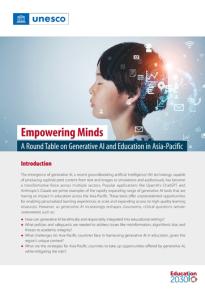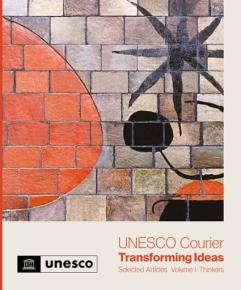Publication
UNESCO’s Recommendation on the Ethics of Artificial Intelligence: key facts

With its unique mandate, UNESCO’s Social and Human Sciences Sector has led the international effort to ensure that science and technology develop with strong ethical guardrails for decades.
Be it on genetic research, climate change, or scientific research, we have delivered global standards to maximize the benefits of the scientific discoveries, while minimizing the downside risks, ensuring they contribute to a more inclusive, sustainable, and peaceful world. We have also identified frontier challenges in areas such as the ethics of neurotechnology, on climate engineering, and the internet of things. This has been done with the unvaluable support of our expert committees, the Committee on the Ethics of Science and Technology and the International Bioethics Committee.
In no other field is the ethical compass is more relevant than in artificial intelligence. These general-purpose technologies are re-shaping the way we work, interact, and live. The world is set to change at a pace not seen since the deployment of the printing press six centuries ago. AI technology brings major benefits in many areas, but without the ethical guardrails, it risks reproducing real world biases and discrimination, fueling divisions and threatening fundamental human rights and freedoms. AI business models are highly concentrated in just few countries and a handful of firms — usually developed in male-dominated teams, without the cultural diversity that characterizes our world. Contrast this with the fact that half of the world’s population still can’t count on a stable internet connection.
To correct this, under the leadership of UNESCO’s Director-General Audrey Azoulay, and a clear mandate by our Member States, we elaborated the world’s most comprehensive international framework to shape the development and use of AI technologies. The Recommendation on the Ethics of Artificial Intelligence was adopted by acclamation by 193 Member States at UNESCO’s General Conference in November 2021. This comprehensive instrument was two years in the making and the product of the broadest global consultation process of expert, developers, and other stakeholders from all around the world. It was an honour to spearhead this effort and support Member States in accomplishing this important task.
The Recommendation emphasizes who should be in control of these technologies. It makes a strong call to governments around the world to establish the necessary institutional and legal frameworks to govern these technologies and ensure they contribute to the public good. It clearly signals the end of the “self-regulatory model” that has prevailed, prioritizing commercial and geopolitical objectives over people for too long.
The Recommendation establishes a set of values in line with the promotion and protection of human rights, human dignity, and environmental sustainability. It advances essential principles such as transparency, accountability, and the rule of law online.







